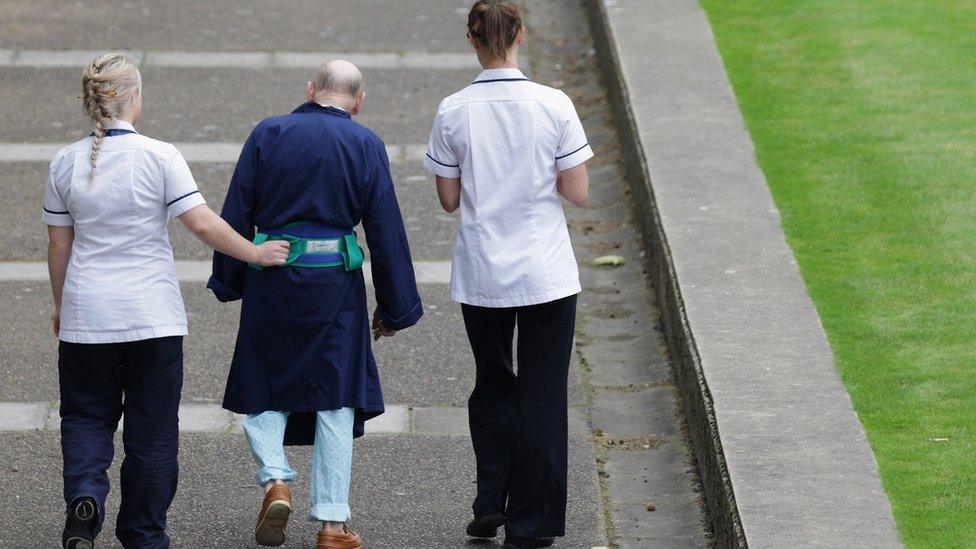Health the biggest risk to UK finances
- Published

Health is "by far" the biggest risk to the country's spending plans
The UK's fiscal watchdog has said health costs are the biggest risk to the government's spending plans.
The Office for Budget Responsibility's (OBR) says the UK faces the challenge of an ageing population and the high cost of technological advances.
It also says: "Lifting current limits on public sector pay increases would pose a fiscal challenge."
But on Brexit, the OBR says a large "divorce bill" for leaving the EU would not be a big threat to UK finances.
Instead it argues that trade agreements with the EU and other trading partners are more important for the long-term growth of the UK economy.
The OBR's first ever Fiscal Risks Report, external outlines a range of risks that the UK now faces, and adds that the issues are complicated because the "ongoing challenges must be faced while negotiating Brexit and in an environment of 'austerity fatigue'".
It also says that the country's finances are far more fragile than they were before the financial crisis, ten years ago: "The deficit is at 2-3% of GDP (only just back to its pre-crisis level), but net debt is above 85% (more than twice its pre-crisis level).
Pay
Chancellor of the Exchequer Philip Hammond MP said: "This is a sober analysis of the challenge we continue to face, and a stark reminder of why we must deliver on our commitment to deal with our country's debts.
"The Labour party would ignore these warning signs from the OBR, adding to the bill that our younger generation will have to pay. "
John McDonnell, Labour's shadow chancellor, said: "The Tories want to blame Brexit for their failures on the economy, but what this report really reveals is that one of the biggest risks to our economy is Theresa May's weak Government, and the last seven year of Tory economic failure."
The report outlines how economic growth is central to the amount of tax the country can collect. As an example, it says that over 50 years, an annual fall of just 0.1% in economic output would cause Britain's debt-to-GDP ratio to be 50 percentage points higher.

Smoking risk - tobacco and fuel are bringing in less tax
It says that the way taxes are raised is changing as society changes. It outlines ways in which taxes are bringing less cash into the Treasury:
Fuel and tobacco duty are falling, as engine efficiency improves and smoking declines
The rise in self-employment and incorporation (forming a company) has reduced receipts from income tax
Policies to tackle tax avoidance and evasion have produced "a "relatively uncertain yield"
Tax is coming from a smaller number of taxpayers, which makes the tax system more sensitive to downturns.
The OBR also examines how another crisis in the financial sector could hit the government's budget, largely because of the large contribution it makes in taxes. Finance and insurance accounts for 3% of the UK workforce but represents 7% of economic output.
The report says: "Financial crises are fiscally costly. Regulation has been tightened since the crisis, but credit-related vulnerabilities remain. And Brexit and cyber-security represent new sources of risk."
Flu and flooding
As well as dealing with the obvious threats the 300 page report highlights a range of risks that could batter the government's tax and spending plans in the coming years.
It covers everything from foreign currency exposure to cost over-runs in infrastructure projects like the HS2 high speed rail link.
For instance, it explains how NHS spending on clinical negligence claims has doubled in cash terms over the past six years and has risen by almost half over the past two.
The reports adds: "There is a risk that greater pressures on medical professionals lead to higher numbers of incidents and future claims. This type of adverse feedback seems plausible".
On the future cost of decommissioning nuclear power stations, it says that estimates range from £95- £218bn.
It says: "While the numbers are big from the perspective of the department managing them they are less so from the perspective of the public sector as a whole. That said ... the risk that annual spending rises by more than £1bn in any year is far from negligible."
And it also covers the risks of "unanticipated events" which include everything from flu pandemics to coastal flooding and widespread electricity failure.
It says: "successive terrorist attacks have prompted debate over the funding of police and security services, while the number of tower blocks that have failed fire safety tests since the tragedy at Grenfell Tower could require significant sums to resolve".
Under its charter, the Office for Budget Responsibility has to produce a report on fiscal risks every two years. The Treasury has to reply to the report within a year.
- Published8 February 2017
- Published8 March 2017
